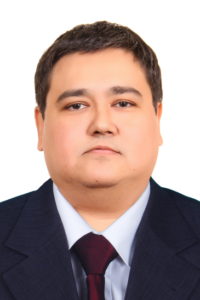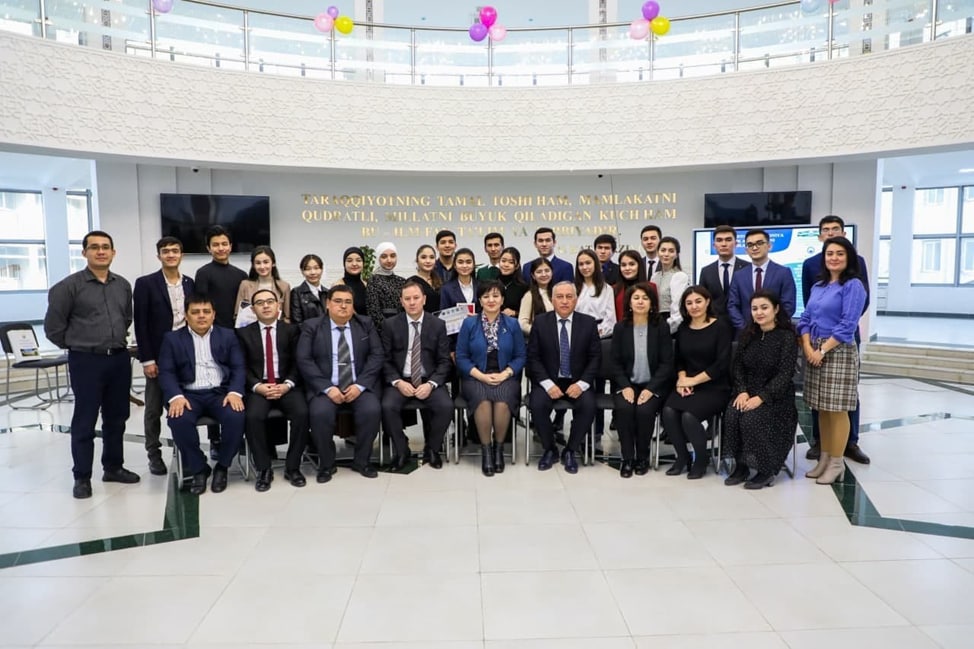FACULTY OF JAPANESE STUDIES
 |
MATCHANOV ELYOR OMONBOYEVICH | |
| Scientific degree and title: | Senior teacher | |
| Post: | Dean of the Faculty | |
| Reception hour: | Every day (10:00-12:00) | |
| Phone: | +99893 599-26-13 | |
| E-mail: | ydec@tsuos.uz | |
FACULTY OF JAPANESE STUDIES
Tashkent State University of Oriental Studies is one of the leaders in the development of the Japanese language in Uzbekistan. Founded in 1992, the Department of “Japanese philology « is the first educational institution for teaching the Japanese language not only in Uzbekistan, but also in Central Asia. In recent years, research in the field of Japanese studies has led to the creation of a new faculty. On December 4, 2019 at the Tashkent State University of Oriental Studies was held the opening ceremony of the Faculty of Japanese Studies.
The opening of this faculty will play an important role in the training of specialists during the development of political and economic relations between Japan and Uzbekistan, one of the world’s leading countries.
Its opening at the Tashkent State University of Oriental Studies provides an opportunity to combine the process of teaching and research in the Japanese language, to coordinate directions in this field, to raise the level of Uzbek Japanese studies to a new level. The most important task of the faculty is not only to teach japanese, but also to develop Japanese studies, that is, to train specialists and researchers in the field of japanese linguistics, japanese literature, japanese politics, economics, history and culture.
Partner organizations of the faculty:
- Yunusabad Academic Lyceum in Tashkent city.
- “Ishga marhamat” Mono Center
- Secondary school 81 in Tashkent city.
- Secondary school 33 in Tashkent city.
International cooperation of the faculty:
- Tokyo University of Foreign Languages.
- Hosei University.
- University of Tsukuba.
- Waseda University
- Sofia University
- Aichi University
- Kyoto University
- Kansai University
- Kanazawa University
The undergraduate of faculty education:
(Total number of students: 341)
| As the main language (Japanese) | 276 students +
37 evening students |
| As second language | 28 students |
The undergraduate of faculty education:
(Total number of students: 12)
| As the main language(Japanese) | 12 students |
Exchange students in Japan: (Total number of students: 20)
| Undergraduate | 12 students |
| Graduate | 8 students |
Japan students came to TSUOS: (Total number of students: 8)
| Tokyo University of Foreign Languages | 2 students |
| Hosei University | 1 students |
| Tsukuba University | 1 students |
| Kyoto University | 2 students |
* The total number of professors and teachers in the faculty is 22.
DEPARTMENT OF JAPANESE PHILOLOGY
The first head of the department was associate professor Kim Mun Uk. In 1993-1999 the department was headed by the candidate of philological sciences N.Pak, in 2000-2010 by M.Ibragimova, in 2011-2013 by the candidate of philological sciences, associate professor N.D.Kim, In 2014-2018 by the senior teacher E.O. Matchanov. Currently, the department is headed by PhD N.T. Khalmurzayeva.
Most of the professors and teachers of the Department of Japanese Philology are graduates of this department. The young and qualified teachers of the department are distinguished by their dedication to their profession. Along with these teachers, Sugano Reiko, a Japanese specialist who has been contributing to the qualified and high-quality training of students since the first day of the department’s establishment, is in constant search. In 2014, she was awarded the Order of Friendship by the First President of the Republic of Uzbekistan Islam Karimov in recognition of her contribution to the development of Japanese studies in Uzbekistan. Sugano Reiko’s books «Japanese language textbook», 1-2 parts, published in 2010 in collaboration with teachers of the Japanese department, and «Japanese language textbook – 3», published in 2015, are currently used by teachers and students of the department. Also, recently years of publications:
- Suagoa Rango. “Language situation in Japan”. Textbook. Tashkent-2021.
- Turapova N.A. “Simultaneous translation”. Study guide. Tashkent-2021.
- Turapova N.A. “Linguistic and cultural analysis of the semantics of somatic phraseological units of the Japanese and Uzbek languages Atama (head)”. Monograph. Tashkent-2022.
- Fatkulina L.N. “Japanese Yazyk”. Uchebnoe posoie. Tashkent-2021.
- Abdukhamidova D.A. “Japanese language” textbook. Tashkent-2021.
- Toursomova N., Turdaliyev O. Textbook “Introduction to Oriental Sciences”. Tashkent-2021.
- Abdurahimova D. “The practice of reading Japanese fairy tales”. A set of exercise. Tashkent-2021.
The Central Asian Research Center of the University of Tsukuba has been operating at the Tashkent State University of Oriental Studies since 2006. At the initiative of this center, scientific conferences of professors and teachers are held annually in cooperation with the University of Tsukuba, and the reports of the conference participants are published as a collection.
The scientific activity of the department includes the following areas:
– Comparison of Japanese and Uzbek language learning;
– Theoretical and practical problems in the translation of literary texts;
Subjects taught at the department
Bachelor degree:
- Main Oriental Language (Japanese) 1-4 courses.
- Foreign language (Japanese).
- Theoretical grammar of the main Eastern language (Japanese).
- Comparative grammar of the main Eastern language and Uzbek language
(Japanese).
- Special course in main Oriental language:Fundamentals of Japanese hieroglyphics.
- Main language lexicology.
- Phonetic system of the main Eastern language (Japanese)
- Main Oriental Language Writing System (Japanese)
Master’s degree:
- Language situation in the country of study (Japan).
- The practice of using respect categories in Japanese business speech.
- Reading and description of philosophical manuscripts.
- History of the language (Japan).
Professors and teachers of the department:
- Sugano Reyko-docent
- Khalmurzayeva Nodira (PhD) (head of the department)
- Nargiza Turapova – senior teacher (PhD)
- Elyor Matchanov – senior teacher
- Fatkulina Luiza – senior teacher
- Ishimura Ikumi – teacher
- Koike Rina – teacher
- Tursunova Nilufar – teacher
- Nadjimkhodjaev Marufkhodja – teacher
- Turdaliyev Obidjon – teacher
- Temirova Muslima – teacher
- Yokubova Maftuna – teacher
- Habibulina Alfiya – teacher
- Saidov Umid – teacher
DEPARTMENT OF “HISTORY, CULTURE, POLITICS AND ECONOMY OF JAPAN”
According to the order of the rector of the Tashkent State University of Oriental Studies dated November 1, 2019 № 01-863, the department of “History, Culture, Politics and Economy of Japan” was established within the Faculty of “Japanese Studies”. The department aims to train qualified specialists in Japanese culture, politics, history and economics. In the areas of education attached to the department, Japan’s domestic and foreign policy, its role in international and regional relations, participation in global political processes, the Japanese economy and financial system at the present stage, the country’s innovation policy, modernization processes in Japan, the country’s economic development models, as well as , The history of Japan, the historical stages of socio-economic development, the history of Japanese political doctrines are studied.
Directions of Education:
- 5120700 – Political Science (Japan)
- 5231000 – Economy of foreign countries and country studies (economy of Japan)
- 5120300- History (Japan)
Subjects taught at the department
Bachelor’s degree: Political Science (Japan) (credit-module system)
- International relations
- Theory of international relations
- Political culture in Japan
- Comparative political science
- Japan in world politics
- International security issues
- Political technologies
- Japanese and international organizations
- Japan’s policy in Central Asia
- Conflictology
5231000-Foreign Economics and Country Studies (Japanese economy) (credit-module system)
- Macroeconomics
- The Japanese economy
- Experimental economics
- Economic statistics
- History of the Japanese economy
- Regional economy
- Small business in Japan
- Fundamentals of economic development
- The Japanese monetary system
- The impact of globalization on the business and labor markets
- Economic Geography (Japan)
2-course
- Fundamentals of econometrics
- Mathematical methods and modeling in economics
- Economic theory
- Economy of Uzbekistan
- Macro and micro economics
- The Japanese economy
3-course
- Basics of accounting
- Basics of marketing and management
- World economy and international economic relations
- Special Economic Zones and Investment Policy in Japan
- Models of economic development of Japan
4-course
- Japan’s foreign economic activity
- Modernization and diversification processes in Japan
- Japan’s innovation policy
- Institutional changes in the Japanese economy
5120300-History (History of the East (Japan))
1-course (credit-module system)
- History of Japanese politics
- Socio-economic history of Japan
- Historical geography of Japan
2-course
- World history
- Archival science
- Fundamentals of historical research
- History of Japan
- Historical geography of the Far East (Japan)
- History of socio-political doctrines in Japan
3-course
- World history
- History of Japan
- Japanese culture and history
- History of the Japanese political system
4-course
- History of Japan
- Japan’s policy in Central Asia
- Japan in world politics
- History of Japanese diplomacy
- Japanese state system and political parties
Professors and teachers of the department:
- Alimov Oqliddin – (PhD) (head of the department)
- Kasimova Zilola – (PhD) senior teacher
- Zaripova Zebiniso – senior teacher
- Imomnazarov Kahramon – teacher
- Haydarova Nazokat – teacher
- Egamova Kamola – teacher
- Akhmedova Saodat – teacher
- Yuldasheva Kamila – teacher
